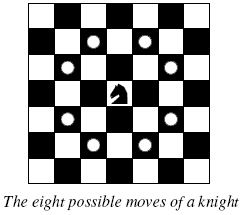POJ2488 A Knight's Journey(dfs)
来源:互联网 发布:上海上知营销策划公司 编辑:程序博客网 时间:2024/05/19 22:45
Description
 Background
Background The knight is getting bored of seeing the same black and white squares again and again and has decided to make a journey
around the world. Whenever a knight moves, it is two squares in one direction and one square perpendicular to this. The world of a knight is the chessboard he is living on. Our knight lives on a chessboard that has a smaller area than a regular 8 * 8 board, but it is still rectangular. Can you help this adventurous knight to make travel plans?
Problem
Find a path such that the knight visits every square once. The knight can start and end on any square of the board.
Input
The input begins with a positive integer n in the first line. The following lines contain n test cases. Each test case consists of a single line with two positive integers p and q, such that 1 <= p * q <= 26. This represents a p * q chessboard, where p describes how many different square numbers 1, . . . , p exist, q describes how many different square letters exist. These are the first q letters of the Latin alphabet: A, . . .
Output
The output for every scenario begins with a line containing "Scenario #i:", where i is the number of the scenario starting at 1. Then print a single line containing the lexicographically first path that visits all squares of the chessboard with knight moves followed by an empty line. The path should be given on a single line by concatenating the names of the visited squares. Each square name consists of a capital letter followed by a number.
If no such path exist, you should output impossible on a single line.
If no such path exist, you should output impossible on a single line.
Sample Input
31 12 34 3
Sample Output
Scenario #1:A1Scenario #2:impossibleScenario #3:A1B3C1A2B4C2A3B1C3A4B2C4
国际象棋中马的走法,比较棘手的是题目要求输出路径,并且是按照字典序,故需要从第一个格开始。
AC代码:
#include "iostream"#include "cstdio"#include "cstring"#include "algorithm"using namespace std;struct node{/* data */int row;char col;};int p, q, x, y;bool map['Z' + 1][27];void path(int i, int j, int num){switch(num) {case 1: {x = i - 1;y = j - 2;break;}case 2: {x = i + 1;y = j - 2;break;}case 3: {x = i - 2;y = j - 1;break;}case 4: {x = i + 2;y = j - 1;break;}case 5: {x = i - 2;y = j + 1;break;}case 6: {x = i + 2;y = j + 1;break;}case 7: {x = i - 1;y = j + 2;break;}case 8: {x = i + 1;y = j + 2;}}}bool dfs(node* a, int i, int j, int step) {map[i][j] = true;a[step].row = i;a[step].col = j;if(step == a[0].row) return true;for(int k = 1; k <= 8; ++k) {path(i, j, k);int ii = x, jj = y;if(!map[ii][jj] && ii >= 1 && ii <= p && jj >= 'A' && jj <= 'A' + q - 1)if(dfs(a, ii, jj, step + 1)) return true;}map[i][j] = false;return false;}int main(int argc, char const *argv[]){int n;cin >> n;int t = 1;while(t <= n) {memset(map, false, sizeof(map));cin >> p >> q;if(p == 1 && q == 1) {cout << "Scenario #" << t++ << ":" << endl;cout << "A1" << endl << endl;continue;}node a[p * q + 1];a[0].row = p * q;bool flag = false;for(int j = 'A'; j <= 'A' + q - 1; ++j) {for(int i = 1; i <= p; ++i)if(dfs(a, i, j, 1)) {cout << "Scenario #" << t++ << ":" << endl;for(int k = 1; k <= a[0].row; ++k)cout << a[k].col << a[k].row;cout << endl << endl;flag = true;break;}if(flag) break;}if(!flag) {cout << "Scenario #" << t++ << ":" << endl;cout << "impossible" << endl << endl;}}return 0;} 1 0
- POJ2488 A Knight's Journey(DFS)
- POJ2488 A Knight's Journey(DFS)
- POJ2488 A Knight's Journey DFS
- DFS poj2488 A Knight's Journey
- POJ2488 A Knight's Journey(dfs)
- POJ2488 A Knight's Journey(DFS)
- POJ2488 A Knight's Journey(DFS)
- POJ2488 A Knight's Journey[dfs]
- poj2488(DFS)之A Knight's Journey
- POJ2488 A Knight's Journey (DFS)
- poj2488-A Knight's Journey【DFS】
- POJ2488-A Knight's Journey(DFS)
- POJ2488:A Knight's Journey(DFS)
- Knight's Journey(poj2488,dfs)
- poj2488 A Knight's Journey
- poj2488 - A Knight's Journey
- poj2488 A Knight's Journey
- POJ2488--A Knight's Journey
- hdoj 1181 变形课【DFS】
- 南邮 OJ 1397 Decoding
- xcode6 自动添加注释插件攻略
- win7_oracle11g_64位连接32位PLSQL解决方案
- [转]协程 及 Libco 介绍
- POJ2488 A Knight's Journey(dfs)
- HDU 5344 MZL's xor(水题)
- hdu 5347 MZL's chemistry(水)
- 信号量
- win7 中如何设置eclipse的背景色--Packge Explorer
- [转]互联网的长在线、心跳和断线重连
- C#实现得到本机IP以及网关地址
- iOS 开发 UI 搭建心得(二)—— 善用 xib
- 基础母函数


